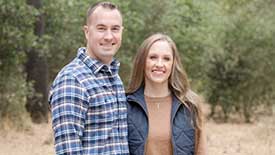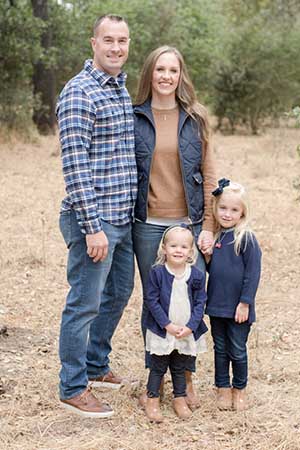Nursing alum shares challenges of caring for COVID-19 patients

In nearly 11 years working as a nurse at Regional Medical Center in San Jose, California, Christy Murray Stromska ’07 ’09 has seen it all.
She has been on call during a mass shooting. “The fear of the unknown as ambulance after ambulance rolled into the ambulance bay was probably one of the most emotional experiences I’ve had nursing,” said Stromska, who earned sociology and nursing degrees from UNC Charlotte and was a member of the University’s softball team.
Stromska was ready when the Ebola virus was a concern. “When Ebola was a threat, we were prepared,” Stromska said. “We did a lot of training regarding how to screen incoming patients and how to properly protect ourselves and everyone else in the hospital, specifically with PPE (personal protective equipment).”
But the COVID-19 pandemic has presented a very different challenge for Stromska and other nurses. It spread quicker than the health care community could prepare for it.
“What we had no idea of was that a week after our first couple of coronavirus patients arrived in March, the hospital would already be into its disaster relief supply of PPE and telling us we have nothing more, as patient after patient continued to fill the unit,” Stromska said. “By April, our 34-bed ICU (intensive care unit) became a 54-bed ICU.
“The coronavirus has been the most mentally and physically draining experience of my career. I never imagined I would be the charge nurse of a 54-bed ICU. The fear of no PPE as everyone arrived for their shifts and looking for someone to have answers has been the biggest strain on the nurses in the units caring for the COVID-19 patients. Everyone has a family, and everyone deserves to equally be protected at work.”
 Stromska said her hospital has implemented a system of rationing and reusing its supply of personal protective equipment during each shift, which she said has helped ease fears for her and her fellow nurses. They have all worked double shifts and are caring for more patients than the nurse-to-patient ratio allows.
Stromska said her hospital has implemented a system of rationing and reusing its supply of personal protective equipment during each shift, which she said has helped ease fears for her and her fellow nurses. They have all worked double shifts and are caring for more patients than the nurse-to-patient ratio allows.
“Mentally, I think everyone has shown up to work like they are headed into battle,” Stromska said. “We don our PPE and do the job. It’s been hard having to paint a picture to families over the phone of the scenario and describe how sick their loved one is, especially if they have never seen the inside of an ICU. Needless to say, days off are much needed to refuel and decompress.”
Stromska makes sure to wear the appropriate masks when in contact with patients, frequently washes her hands and disinfects any personal belongings that she takes to work. And the mom of two said she doesn’t hug and kiss her children when she gets home from work until she showers.
And as we continue to battle this virus, a nurse who has witnessed firsthand the devastation it has had on individuals and families has an extra piece of advice.
“Most importantly, just give yourself some grace during this time and be kind and patient with one another,” Stromska said. “No one knows the struggle they may be going through.”